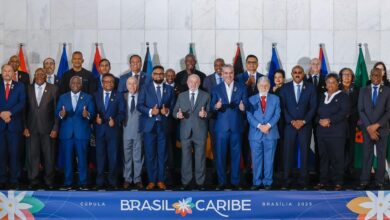Let me begin by being quite relevant, in extending a pleasant climatic and environmentally peaceful day to all of you. It is a real pleasure, and a genuine honour, to welcome you to this Ministerial Meeting on Climate Change and Development. Indeed, I feel particularly honoured to welcome you today in my capacity as CARICOM’s lead Head of Government with responsibility for the Sustainable Development portfolio, which includes Climate Change.
We have convened here at this juncture to advance our discussions on issues pertaining to the greatest environmental phenomenon of our time and to further refine and crystallize our regional response thereto. Climate Change, with the exception of the Global Financial Crisis, is probably the single most important Global diplomatic agenda item occupying the time and energies of World leaders at this time. Our deliberations therefore form part of that dialogue in preparation for that journey along the road to Copenhagen.
In July, just two months ago, we, the CARICOM Heads, were kindly hosted by President Jagdeo at Liliendaal, in the Republic of Guyana. At that meeting, we discussed the issue of Climate Change and Development in great depth, and expressed our resolve in addressing this matter in the Liliendaal Declaration. While it is not my intention today to go into great detail about either the meeting or the Liliendaal Declaration, I feel constrained to highlight two specific points regarding the latter.
In the Declaration, among other things, we “affirmed the importance of a common Regional approach to address the threats and challenges of climate change and of the full and effective participation of the Region in the upcoming United Nations Climate Change Conference in Copenhagen, Denmark (COP15), the UN Secretary-General’s Climate Change Summit in September 2009 and their preparatory processes.”
The manifestations of climate change are now becoming evident everywhere, including in our own Region. These manifestations are merely a portent of things to come. Given the fact that our countries are among the most vulnerable to climate change, as well as the fact that there is so much commonality among us in this respect, we are really left with no option but to ensure that our response is collective and unequivocal. This must be nowhere more so than in the international negotiation process that takes place under the rubric of the United Nations Framework Convention on Climate Change.
Colleagues, Ministers, Ladies and gentlemen, in the Liliendaal Declaration, Heads of Government, also declared that “all Parties to the UNFCCC should work with an increased sense of urgency and purpose towards arriving at an ambitious and comprehensive agreement at the COP 15 in Copenhagen in 2009, which provides for: long-term stabilization of atmospheric greenhouse gas concentrations, at levels which will ensure that global average surface temperature increases will be limited to well below 1.5° C of pre-industrial levels; that global greenhouse gas emissions should peak by 2015; global CO2 reductions of at least 45 percent by 2020 and reducing greenhouse gas emissions by more than 95 per cent of 1990 CO2 levels by 2050”.
In the last year, Copenhagen – this famed and ancient capital city of Denmark – has become even more renowned for an achievement that has yet to be realized. Indeed, the name Copenhagen has now become synonymous with success – success on the part of the global community of nations in attempts at achieving consensus, by December 2009, on a new architecture for realistically tackling climate change and securing the future of all mankind. Certainly, even before we get to Copenhagen, there will be other transitional stops – in Bangkok and Barcelona.
Reflecting on the declaration by the CARICOM Heads, you will recall that it is very specific with regard to temperature limits, dates and greenhouse gas reduction levels. This is certainly no accident. These numbers are included by design and are derived from the latest science. They can be considered our “vital statistics,” as they define the conditions under which Small Island Developing and Low-lying Coastal States, such as ours, can survive.
Colleagues, Ministers, ladies and gentlemen, those of us who have been following the UNFCCC negotiations over the past several months woud have realized that many developed countries have been tabling, and rallying around, “emissions reductions targets” that are less stringent than ours. It appears to me that some are even of the view that acceptance of their proposals is a “fèt e kom plée.”
Esteemed colleagues, negotiations are about “give and take;” about flexibility and, as they say in the vernacular, a bit of “horse-trading.” Nevertheless, some things will always be non-negotiable. Our right to exist, our right to pursue sustainable development, can never be placed on the bargaining table. Our survival cannot be exchanged, bought or sold.
It is for this simple reason that, despite displaying great flexibility in the negotiation process, the Alliance of Small Island Developing States (AOSIS), so effectively chaired by Grenada, has been resolute in its position with regard to global emission reductions targets. While many other Parties have proposed alternative targets, AOSIS has maintained the position that allowing a temperature increase of more than 1.5 degrees and pursuing an emissions reduction timeline less urgent or stringent than what it has proposed will literally signal the death-knell for many small-island civilizations in the short and long-term.
Colleagues, Ladies and gentlemen, while the outcome of the negotiations on global emissions reductions targets will in great measure influence the overall outcome of COP-15, there will be many more issues to be resolved.
For example, Adaptation will continue to be of critical importance to our region. Our focus, in this regard, must be on implementation and mobilizing action on adaptation at all levels to address current and future impacts. Our negotiators must continue now, to make the case for enhanced action on adaptation up to and beyond 2012 that gives priority to vulnerable developing countries such as ours.
This must of course be supported by a flexible country-driven approach that allows for the following:
(1) Institutional arrangements under the Convention process to coordinate efforts to support country-driven priorities;
(2) New, additional and predictable financial resources, separate and apart form Overseas Development Assistance, supported by appropriate institutional mechanisms;
(3) A dedicated funding mechanism for adaptation. On a related note, I wish to reiterate full support of the Heads for the location of the Headquarters of the UNFCCC Adaptation Fund Board in Barbados;
(4) Risk management and risk reduction strategies, including risk sharing and transfer mechanisms, such as insurance through a mechanism to address loss and damage from Climate Change impacts; and
(5) Enhanced capacity and knowledge sharing and transfers of adaptation technologies.
In the area of Mitigation, there has already been much discussion on the question of Nationally Appropriate Mitigation Actions (NAMAs), on the part of developing countries. Our negotiators must push for NAMAs to be truly “nationally appropriate” and to reflect the national circumstances of respective groups of countries, while contributing to overall global emissions reductions in a measurable way. They must also continue to work to resolve issues such as scale and the registration of NAMAs.
Another matter of importance to our region is that of Reducing Emissions from Deforestation and Degradation or REDD. At Liliendaal, the Heads recognized the “value and potential of standing forests, including pristine rainforest, and our affirmation of its potential contribution to Reduced Emissions from Deforestation and Degradation (REDD).” It is therefore in this spirit that our negotiators should work towards addressing some of the outstanding issues relevant to this matter.
Still in the area of mitigation: discussions will continue on emissions from marine transport and aviation. Emissions from international transport clearly need to be addressed, but in a manner that is not harmful to small, fragile economies such as ours. It is in this context that I am obliged to make brief reference to the additional charges imposed recently on airline tickets by a certain European ally.
Distinguished Colleagues, ladies and gentlemen, it is clear that there will be a great deal to be resolved before, in and beyond Copenhagen. To this end, we have seen an unprecedented number of negotiating sessions this year and there has been a great deal of discussion and debate, both within and without the process. Naturally, dialogue is the means by which we anticipate that we will achieve the desired outcomes, but we must beware of becoming ensnared in the process; for while there is an ancient proverb that says: “Be not afraid of going slowly; be only afraid of standing still,” there is another which says: “To talk much and arrive nowhere is the same as climbing a tree to catch a fish.” My friends let us be clear in our minds, and know what we want in Copenhagen. We must be focused and must, always, keep our ultimate objective in mind, with great clarity.
Be that as it may, I am sure that these two days will be recorded eventually as having been extremely busy for you, here in Saint Lucia. Apart from the issues I have briefly touched upon, there will be discussions, among others, on technology, finance, the economic implications of climate change for our region, and our Shared Vision. However, with our collective resolve, knowledge and experience, we will be more than equal to the task.
In closing, let me once again officially welcome you, our visiting brothers and sisters, who have made it to our beautiful Country – the Helen of the West. Unfortunately, you may have unavoidably and collectively contributed – in some measure – to carbon emissions as a consequence of your choice of transportation to our shores. Notwithstanding, please accept my sincere best wishes for a successful meeting and permit me the liberty to invite you all – to the extent that time allows and the environment sustains – to enjoy the warmth and hospitality of Saint Lucia and Saint Lucians.
I thank you.




